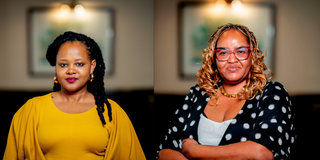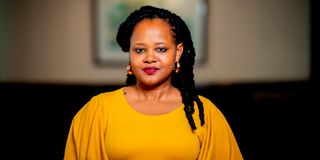Behind the lens: How two Kenyan women directors are revolutionising film

Mkay Mwakaba (left) and June Ndinya. The two women are leading a new era where women's voices reshape storytelling.
What you need to know:
- Kenya's female filmmakers Mkay Mwakaba and June Ndinya are reshaping narratives as they direct a film with a predominantly female team.
- Both directors bring decades of experience and a commitment to authentic storytelling that avoids harmful tropes and the male gaze.
- Their groundbreaking work represents a powerful shift in Kenyan media.
For decades, television has been both mirror and moulder of public opinion, yet its reflection of women's experiences remains stubbornly distorted. According to Aga Khan University's 2024 report 'The state of women in the media: Representation, coverage and framing of women in East African media', women — especially directors and those behind the camera — remain starkly underrepresented in East African media, with top roles still largely dominated by men.
In the male-dominated world of filmmaking, directors Mkaiwawi "Mkay" Mwakaba and June Ndinya are challenging stereotypes and reshaping narratives. While traditional storytelling often relegates women's experiences to the background, these dynamic filmmakers are reclaiming their creative authority and ensuring young women's stories receive the attention, truth, and nuance they deserve.
Working alongside fellow director Likarion Wainaina on MTV Shuga Mashariki, Mwakaba and Ndinya bring their distinctive perspectives to the director's chair. Their collaborative approach represents a powerful shift—placing women's authentic experiences at the centre of the narrative, rather than as footnotes to men's stories or reduced to harmful tropes.
From script to screen, they are accelerating action by weaving compelling tales of self-discovery, resilience, and the urgent social issues facing youth and young women today. It's a powerful statement that heralds a new era in how we tell Kenyan stories, one in which women's voices reshape not only the stories we see but how we navigate the society we live in.

Trailblazing director Mkaiwawi "Mkay" Mwakaba, who evolved from a psychology student and seasoned editor of "Nairobi Half Life" to co-founder of the African Female Filmmakers Collective.
The perspective of female directors is crucial in shaping how themes affecting young women and girls are portrayed on the show.
"Authenticity starts with who is in the room and (it's important) to ensure the process (from script to screen) is as inclusive as the final product. With this new production, it isn't just about telling stories about young women—it is ensuring those stories come from a place of truth, not assumption," Mkay says.
She explains that they are making deliberate effort to hire and incorporate as many women as possible across key departments, starting with the writing team, "where female writers brought nuanced, lived experiences to the script, ensuring that the female characters felt real and layered."
Women have been well-represented across the various departments of MTV Shuga Mashariki's production, including research into societal issues, design, art, and styling; creating an environment where storytelling naturally reflects a female lens. This season is driven by a predominantly female team of scriptwriters, including Mkamzee Mwatela, Annette Shadeya, Makgano Mamabolo (head writer), Ivy Lang'at (a screenwriting intern), and Natasha Likimani, with Arnold Mwanjila as the only male writer. Their work is further supported by female script supervisors Michelle Kivuva and Abigail Wanjira, reinforcing a strong female presence in shaping the show's powerful narratives.
Known for their ground-breaking work in Kenyan film and television, these directors bring a wealth of experience, creativity, and passion to the production.
Mkay says, "As a director, I am intentional about how women's experiences are portrayed on screen - whether it's through camera choices that avoid the male gaze, the way intimate scenes are handled, or ensuring that female characters have autonomy within the story. This approach was also central in my work on 'Makosa Ni Yangu', a film that tackles sexual and gender-based violence. In telling such a sensitive story, it was crucial to centre survivor perspectives while avoiding sensationalism, and that started with having a crew that understood and respected the weight of the subject matter."
Mkay studied film alongside psychology.
"I was and still am fascinated by the human mind but my career took a different path when I started out in the newsroom, which ultimately set the course for my journey in film," she says.
After spending close to 20 years as an editor, she developed a deep understanding of how stories come together. A pivotal moment in shaping her visual storytelling skills came when she edited 'Nairobi Half Life', one of the most watched Kenyan films in cinema and internationally, that would inspire her to get outside the edit suite and into the intricate process of storytelling through film.
In 2014, she took the leap into directing 'Makutano Junction', a popular Kenyan social issues drama that captured issues that affect young Kenyans in a normal African setting. Although editing has been a craft that she kept returning to over the years, working interchangeably between documentary and fiction has been the new normal for her.
Most recently, she's been enjoying her role in directing, with projects like the feature film 'Makosa Ni Yangu', '4Play Series' on Showmax, 'Njeri Series', and 'Sarah' (upcoming documentary film on FGM/C, directed by Nick Reding and executive produced by Wanuri Kahiu), which Mkay describes as a "deeply human story."
Mkay is also the co-founder of the African Female Filmmakers Collective (AFFC), which blends technical expertise with a passion for innovative storytelling.
"Mentorship is one of the reasons I co-founded AFFC, a platform dedicated to empowering and uplifting women in the industry through training, mentorship, and community-building. I have since worked alongside my co-founders - filmmakers Natasha Likimani, Kate Snow, and Serah Mwihaki to develop training programs, mental health initiatives, and networking opportunities for female filmmakers across Africa. It's about building a space where women uplift each other, collaborate, and gain access to the resources they need to thrive."
Her counterpart June Ndinya is a visionary director known for crafting compelling narratives that captivate audiences. She was first inspired by the love for reading books. "Books opened a different world that brought characters to life, shaping my understanding of the human experience. Novels were my first film school, teaching me the intricate dance of character and plot, that drives every compelling story," she says.

Award-winning director June Ndinya. Her journey from book-loving student to visionary filmmaker spans over two decades.
She also explains that her high school drama teacher, Odhiambo James Shishya, saw something behind the aggressive young girl that she was, and ignited a passion within her. "That mentorship transformed my love for reading into a deep appreciation for the power of drama, and for that, I will always be grateful to him."
June is today passionate and dedicated to empowering young women in the film industry, while challenging societal norms.
She says, "I often find my technical expertise questioned even when it was equal to or greater than my male colleagues and the worst situation is finding my ideas attributed to (male counterparts)."
June remains optimistic on the future of women in film.
"While I have faced many challenges, I am encouraged by the future. For example, Shuga's Talent Accelerator program has allowed us to work with a lot of female professionals including Lynn Gitau, an incredibly talented female director. She is learning from the best and this gives me so much hope for the future of women in directing."
Her directorial projects including 'Wingu la Moto' (2002), 'Machachari' (2009), 'Mali' (2012), 'Kona' (2013), 'Flash Squad' (2018), 'Selina' (2019), Pink ladies (2023) and in 2024: 'N* Gen' and 'Prefects' have cemented her reputation as a powerhouse in drama, delivering bold and authentic stories that push creative boundaries.
She promises that MTV Shuga Mashariki will be as impactful. The show is expected to be a bold, thought-provoking exploration of the realities young people face in their relationships, education, and pursuit of independence. The production seeks to challenge harmful gender norms and empower young people to take control of their futures by tackling gender-based violence, among other issues.
So, what's it like to tell stories through the female lens? June attests that her personal experiences have influenced her way of telling stories.
"I have found that being a mother has deepened my empathy and understanding of human emotions, which directly translates to my work as a director and is essential in navigating the complexities of filmmaking. It allows me to connect with actors on a deeper level to understand their characters' motivations and to create authentic and emotionally resonant performances."
MTV Staying Alive Foundation brought MTV Shuga Mashariki back to Kenya in October 2024, with a new season premiering in May 2025.
With their visionary leadership, its directors are set to deliver an unforgettable season. June sums up, "Shuga is my most important work to date and it's incredibly humbling that Mkay and I were chosen for this project. It is really rare for women to get these kinds of opportunities."
She explains that they have to deliver, not just for themselves, but to show that women are more than capable of leading major productions.
"We are working incredibly hard to prove that the trust placed in us is well-founded."
